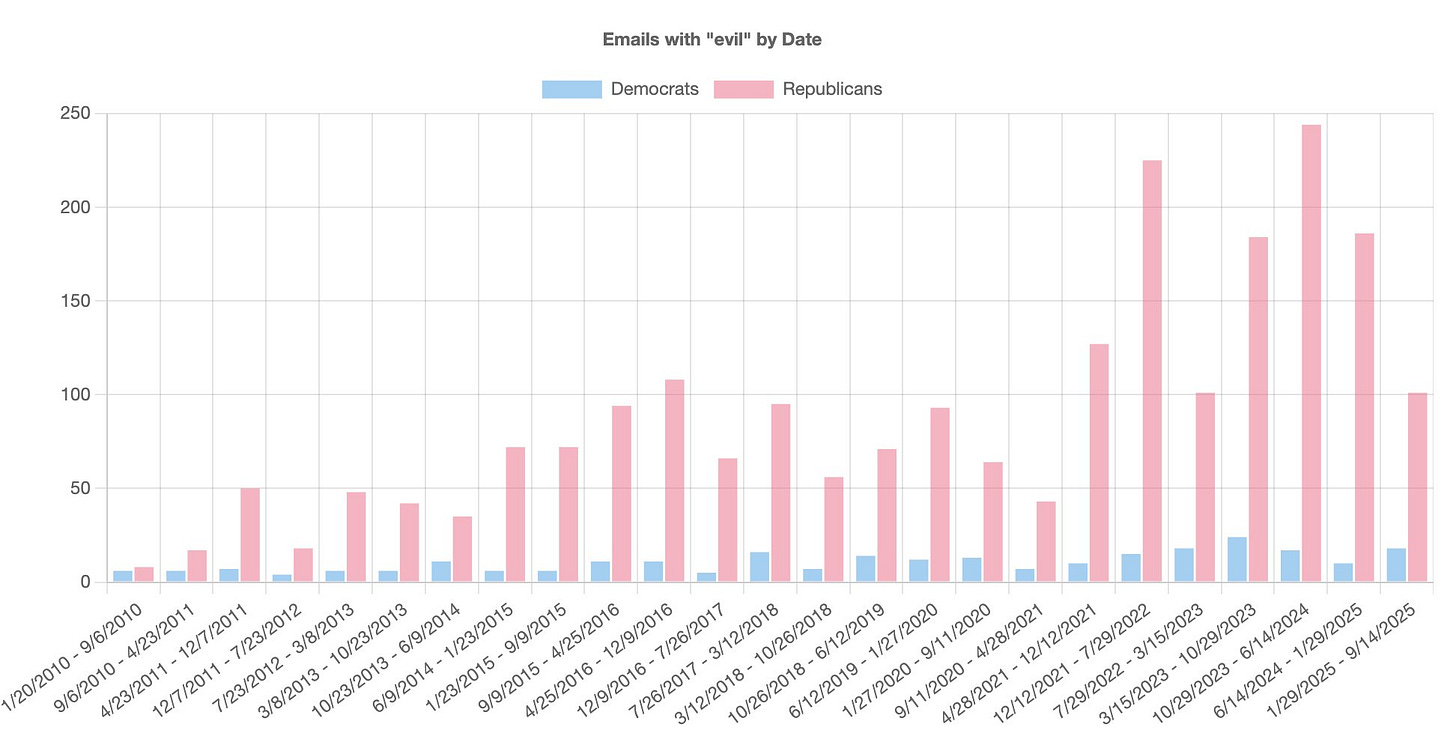In DCinbox, the word “evil” has occurred 2,490 times over the last 15 years, with 89% of all mentions coming from Republicans. I posted the little graph on how this has looked overtime on Bsky and Twitter last week, and it sparked a number of thoughts and questions. Mostly, people noticed the obvious: the sheer volume difference between Republicans and Democrats. But others wanted to know more, specifically about who was being described as evil and which members of Congress were using the word.
Here are the toplines, along with some examples of how legislators write about “evil.” As always, I’m open to hearing your curiosities, so if you’ve got them, let me know. DCinbox Insights can only improve with more attention and feedback. I’d be happy to have yours.
Senator Rick Scott (R-FL) has sent the greatest number of “evil” mentioning messages. On September 5, 2025 he had this to say:
His proclivity for the word undoubtedly contributes to the overall heatmap of where this word is most often used:
When Scott uses the word, it’s most often tied to foreign governments or terrorist groups: “the Iranian regime is evil”, “evil regimes in Russia”, “evil regimes in Cuba, Venezuela and Nicaragua”, “Communist China’s evil dictator, Xi Jinping”,, “Iran and its evil proxies, Hamas and Hezbollah terrorists”, “Russia, and its evil ally Belarus” (for a look at “regime” in DCinbox see here); or in remembrance of shootings in his state including the Pulse Nightclub shooting, the Marjory Stoneman Douglas High School in Parkland, Florida, the attack at Naval Air Station Pensacola; or about the evil drug fentanyl or “the evil of anti-Semitism”. He doesn’t directly call his domestic political opponents evil, but he has said that both Biden and Obama had supported evil,
Other Congressional Republicans, like Brian Babin (R-TX) have called their domestic political opponents evil,
As has Congressman Paul Gosar (R-AZ) in a official communication that comes really close to the limits of not being campaign messaging,
Congressman Jim Banks (R-IN) in 2023 used the word in 2023 after rule making in the the Department of Agriculture barred religious schools from accessing free school meals:
None of these legislators say “Biden is evil” or “Obama is evil” outright in their official communications. Instead, they associate Democratic administrations with appeasing or empowering evil actors. Similarly, Congressional Republicans don’t osay “Democrats are evil” directly, but they do accuse Democrats or “the left” of celebrating evil, refusing to condemn it, or aiding evil actors.
In 2022 Congressman Jeff Duncan (R-SC) gives an example of this style of associative evil framing,
Overall, many of these emails from Congressional Republicans mention “evil” the context of so-called leftist ideologies and foreign adversaries; part of this strategy is naming “evil” so that it can be held accountable.
What do Democrats refer to as “evil”?
Democrats have used the word “evil” far less often—274 times in total. Their targets are also more varied. Democrats have said:
the Taliban and terrorists are evil
they quote the Declaration of Independence
they quote Dr. Martin Luther King, Jr.
call Osama Bin Laden evil
They talk about the evils of the Holocaust
They talk about evil in the context Diwali (a holiday that celebrates the triumph of good over evil), they point out evil in mass shootings like that at the Emanuel African Methodist Episcopal Church in Charleston, South Carolina and after the Pulse Night Club shooting that killed 49 people Congressman Don Beyer (D-VA) said of the tragedy, “murdered in the name of an evil ideology, targeted for their sexual orientation.”, and like congressional Republicans there are also mentions of the “the evil Iranian regime” and other foreign adversaries.
In 2022, Senator Tim Kaine (D-VA) linked January 6 and some state legislators’ actions to evil:
Others who were inside the Capitol described the attackers as evil. Rep. Jim McGovern (D-MA) wrote:
Democrats have also extended the label of “evil” to contemporary politics. Rep. Adriano Espaillat (D-NY) described the immigration actions of Governors Abbott, DeSantis, and Ducey as evil.
More recently Congressman Kweisi Mfume (D-MD) told constituents his version of DOGE was the “Department of Government EVIL”. Rep. Robin Kelly (D-IL) and Rep. Lateefah Simon (D-CA) described Republican health care provisions in the One Big Beautiful Bill as evil. Rep. Rashida Tlaib (D-MI) called the diversion of FEMA funds to detention camps “monstrously evil.” And Rep. Yvette D. Clarke (D-NY) said House Republicans had become “the janitors of authoritarianism and evil.”
Evil in Congressional Communications
Across parties, Republicans use the word “evil” more frequently and often tie it to external enemies, abortion, or cultural issues. On occasion it’s used against specific individual government actors or broader political movements. Democrats use it far less, and when they do, it’s often in reference to terrorism, historical injustice, or specific tragedies, and in more recent periods to describe actors and acts of government. Both sides lean on the moral weight of the word, but how and when they use it says a lot about their political strategies. If nothing else, tracking “evil” reminds us that what’s considered unspeakably bad in political contexts depends on partisan frames.











